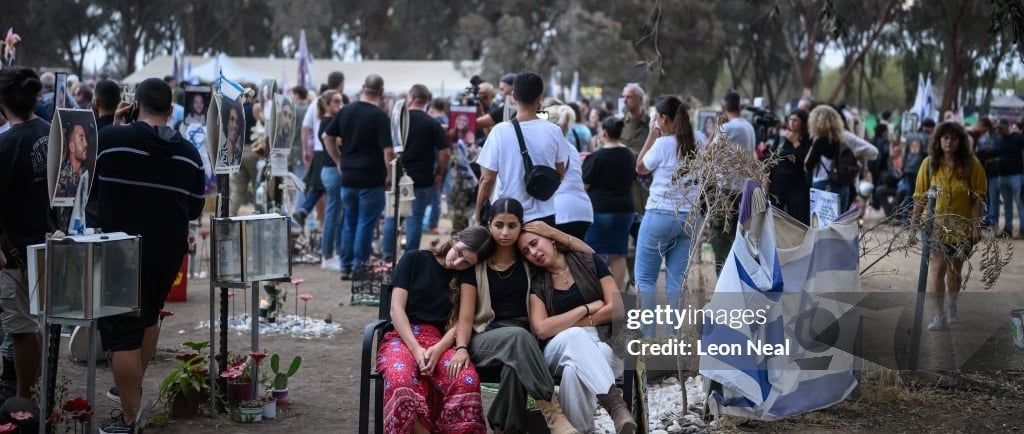Hamas Returns Bodies of Israeli Hostages : Israel-Palestine conflict
Hamas has returned the bodies of Israeli hostages in Khan Younis, Gaza, amid ongoing conflict. Get the latest updates on the Israel-Palestine crisis in West Asia
DAILY UPDATE
Naman Joshi
2/20/20253 min read


In a deeply somber development, Hamas has returned the bodies of four Israeli hostages, including a mother and her two young children, to Israel. This event has cast a profound shadow over the ongoing conflict, highlighting the severe human toll and the complex interplay of political and humanitarian considerations.
The Hostages and Their Abduction
The hostages have been identified as 33-year-old Shiri Bibas and her two sons, four-year-old Ariel and nine-month-old Kfir, along with 83-year-old peace activist Oded Lifshitz. The Bibas family was abducted from their home in Kibbutz Nir Oz during a Hamas incursion on October 7, 2023. The attack resulted in widespread devastation and numerous kidnappings, leaving the Israeli community in profound anguish. Oded Lifshitz, a well-known advocate for peace, was also taken captive during this period.
The Return of the Bodies
On February 20, 2025, Hamas handed over the bodies of these four individuals in a highly publicized event in Khan Younis, Gaza. The ceremony was characterized by a display of propaganda, with coffins draped in Israeli flags presented on a stage adorned with images and slogans targeting Israeli leadership. One particularly provocative image depicted Israeli Prime Minister Benjamin Netanyahu as a vampire, with the hostages’ photographs beneath. Adjacent to the stage, an exhibition permitted children and teenagers to handle firearms, further intensifying the charged atmosphere.
Initially, the International Committee of the Red Cross (ICRC) was hesitant to participate in the ceremony due to its propagandistic nature. However, under pressure from Hamas, the ICRC representative eventually signed the necessary documents to facilitate the transfer. The United Nations’ human rights chief condemned the event as “abhorrent,” emphasizing that such displays violate international law and the dignity of the deceased and their families.
Reactions from Israel
In Israel, the return of the bodies has been met with profound grief and outrage. President Isaac Herzog expressed deep sorrow, stating, “We are heartbroken at the loss of Shiri, Ariel, Kfir, and Oded. Our nation mourns together, and we vow to honor their memory.” Prime Minister Netanyahu described the day as “very difficult and heart-wrenching for Israel,” and called for a dignified handover of the remains.
Context of the Ceasefire and Prisoner Exchange
This development transpires amidst a precarious ceasefire between Israel and Hamas, which was established to facilitate humanitarian aid and the exchange of prisoners and hostages. As stipulated in the agreement, Hamas has released several hostages, both living and deceased, in exchange for Palestinian prisoners held by Israel. The return of the remains of Shiri, Ariel, Kfir, and Oded constitutes a particularly poignant moment in these exchanges, emphasizing the profound personal tragedies that have arisen from the protracted conflict.
International Implications
The public and propagandistic nature of the handover has elicited widespread condemnation from international organizations and leaders. The United Nations’ human rights chief characterized the ceremony as “abhorrent,” asserting that it violated international law and the dignity owed to the deceased and their families. The International Committee of the Red Cross underscored the imperative of respecting the privacy and dignity of those who have perished, emphasizing that any degrading treatment during release operations is unacceptable.
In response to the tragic loss of the Bibas children, who held Argentine citizenship, Argentine President Javier Milei declared a national day of mourning. This gesture underscores the global impact of the incident and the profound impact of the conflict. Sabrina Ajmechet, President of the Argentinian Commission for Human Rights, eloquently stated, “Two Argentinian babies assassinated because of Hamas terrorism. I sincerely hope that this tragedy will serve as a catalyst for change, ensuring that Argentines no longer feel detached from the events unfolding in Israel and Gaza.”
Ongoing Efforts and Future Outlook
The return of these bodies has intensified calls within Israel for the government to secure the release of all remaining hostages and to conclude the cycle of violence. Negotiations continue under the fragile ceasefire, with both sides grappling with internal and external pressures. The Israeli government has reaffirmed its commitment to exhausting all available avenues to ensure the safe return of its citizens and to hold those responsible for these atrocities accountable.
This tragic event serves as a stark reminder of the human cost of the Israeli-Palestinian conflict. As families mourn and nations grapple with the consequences, the aspiration for a lasting resolution that upholds the dignity of all individuals remains a pressing concern for the international community.
